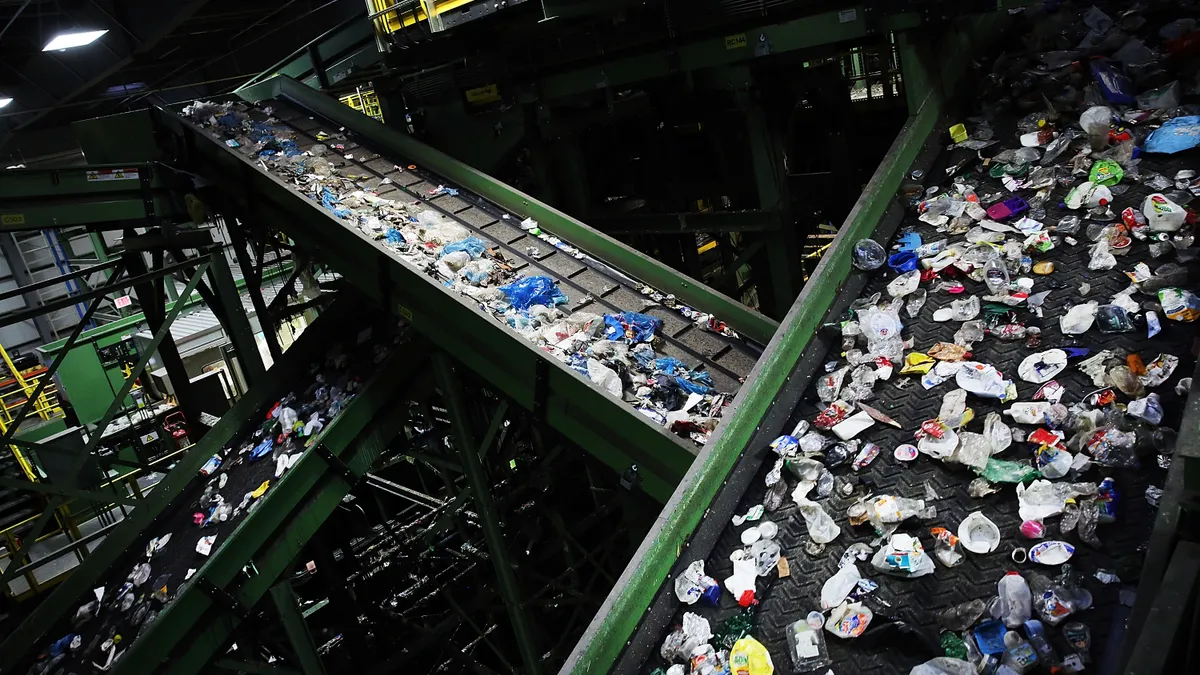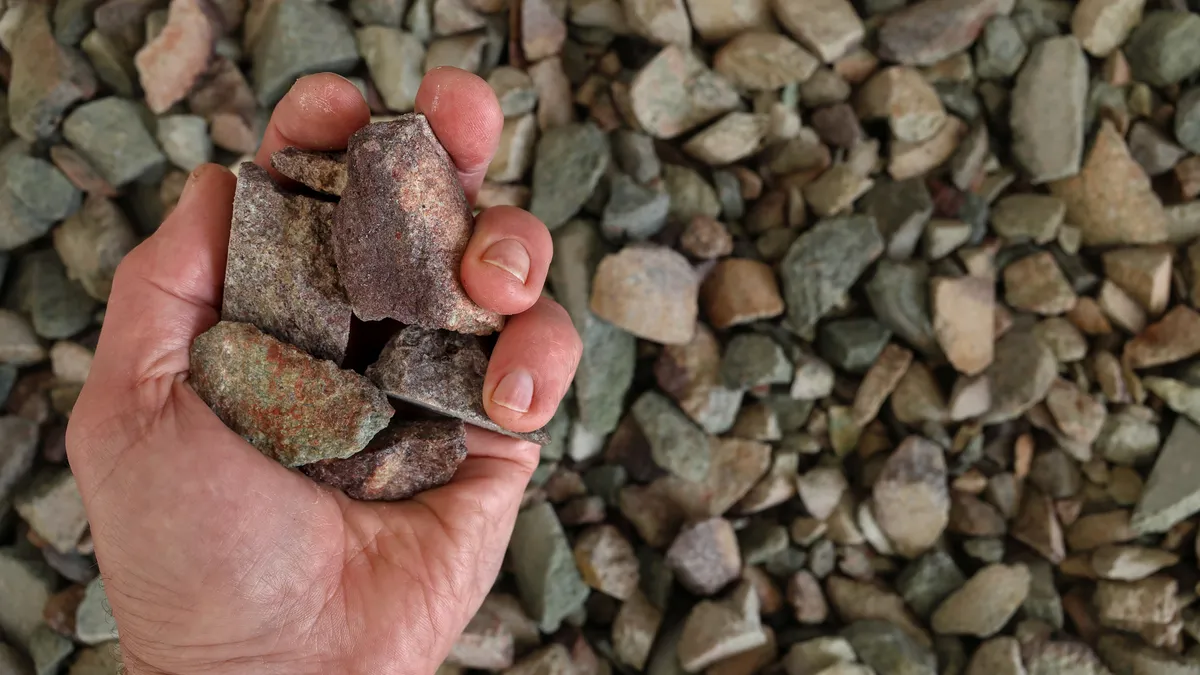For Chris Cui, the planet is personal.
"I was born in southwest China — the Amazon of China," Cui told Waste Dive, outlining her path toward environmental work. "We used to have a lot of tropical forests, but because of economic development, a lot of trees have unfortunately been cut down."
This shifting childhood landscape, she explained, instilled in her a "passion to do something to save the planet" — an urge that has found an outlet at Closed Loop Partners. As director of the fund's China Program, an initiative dedicated to "building bridges in circular economy in China and North America," Cui has a direct line to both U.S. and Chinese companies affected by last year's scrap import policies — and for her, the shift heralds promising opportunities for both countries with regard to sustainable infrastructure investment.
Waste Dive spoke with Cui about her work at Closed Loop Partners, the evolution of China's recycling industry, and potential partnerships on the horizon between U.S. and Chinese stakeholders.
The following conversation has been edited for brevity and annotated for context.
WASTE DIVE: Can you tell me a little about what you do?
CHRIS CUI: I joined Closed Loop last year — we're basically a capital provider to circular economy companies in North America as well as Europe. But last year, after the China ban, we saw a huge opportunity for what we do — so that's why we decided to set up our China Program with the objective of bringing Chinese investment into the U.S. for a circular economy. We'd also like to bridge the gap and bring U.S. technology and business models to Asia for their overseas expansion. So that's also my role at Closed Loop now — I connect industries in the U.S. and China to facilitate dialogue to advance the circular economy.
Can you provide a little bit of context for the China ban? What prompted China's decision to enact its import policies?
CUI: According to our research and conversations with both public and private sectors in China, we feel that the Chinese government has prioritized good development strategies in the past few years — and circular economy is one of the most important policies for China's environmental and ecological protection. In the past, China relied on imports from not only the U.S., but other developed countries. However, air, water and soil pollution have been big problems threatening the quality of life of the 1.4 billion population over there, and the government feels that they have been sacrificing the environment for economic development.
But now, they've decided to invest in their domestic circular economy strategy, meaning that the government, in addition to carrying out policies, is supporting private sectors in the field. There are also the state-owned enterprises in China — they have become more active in circular economy, and the Chinese government has invested in infrastructure to build up circular economy. Because of that, we feel that the import ban wasn't a surprise for the industry in China. It's in line with the green development the government wants to push in the coming years — and now that they've banned recycling imports from other countries, they'll have time to develop domestic infrastructure.
What steps is China taking to build up its domestic recycling infrastructure and circular economy? How successful have these efforts been so far, and what lessons can the U.S. draw from how China is approaching this process?
CUI: In China, it's a more top-down approach, meaning the central government body is launching this strategy. That's a big difference between China and the U.S. In the U.S., we have seen different states and cities with different views or incentives for supporting the development of recycling or circular economy. China's top-down policy makes it easier for investors as well as private companies — they can be confident that the policy will be carried out consistently around the country. It's a national action, and the policy will remain relatively stable in the coming years.
And is current progress in developing a domestic infrastructure largely aligned with what the government initially envisioned?
CUI: It's still relatively new. The policy has been enforced for a year so far — it's not an easy transition for the Chinese industry. We've noticed that a lot of small and medium-sized enterprises (SMEs) in this industry are struggling. That's because the government wants to encourage a more consolidated approach for a circular economy. So we've seen M&A activity, with bigger players acquiring small- and medium-sized players in China.
And then, for the SMEs who have difficulty obtaining finance in China or obtaining feedstock that they were able to import from the U.S. — they are also coming out, not only to the U.S. but to other countries, to stay in business. So we see that in the short term, it's not an easy transition for the private sector, but in the medium and long term, it's definitely a very good business to be in in China.
What are some of China's ongoing circular economy or "zero waste" initiatives?
CUI: So in 2018, the Chinese government came up with a list of pilot cities for circular economy in China. They've also developed a list of zones — circular economy industry parks or zones — in China. And recently, the government short-listed 10 Chinese cities to be "zero waste" cities, including first-tier cities like Shanghai. It's very encouraging to see that, from last year to this year, they've been coming up with pilot cities, circular economy in different zones — and now they're actually moving forward with circular economy development.
A lot of industry stakeholders have said U.S. recycling companies need to pivot toward domestic markets in response to National Sword — but other groups maintain that we'll always need some level of export, and that there's always going to be a global market for scrap. What's your sense of how this balance of export vs. domestic will shift in the coming years?
CUI: We still think recycling is good business in the U.S. — but as you know, in different regions, it really depends on what kind of role the company is playing. We really encourage them to work with the local government, work with NGOs that promote education, in order to improve the efficiency of recycling. We definitely think it's a very good approach to continue to invest in the recycling business in the U.S. — but on the other hand, we think that demand in the U.S. might not pick up in the short term. So we encourage companies to continue to look for markets outside the U.S — maybe not China, maybe other markets — that they can continue to export to.
So we think that recycling in general is still a good business — it doesn't matter if it's in the U.S. or in China — but there are a lot of uncertainties ahead, and one size does not fit all. So we encourage companies to keep an open mind and, instead of waiting to be told what's going to happen, reach out and build partnerships to prepare for what might happen. And before they make any investments, especially [capital expenditures], they should already have a medium or long-term view of what the situation will look like in the U.S. or abroad.
Can you talk a little about what these partnerships might look like?
CUI: Based on our conversations with industry associations and companies in China, we feel that a lot of Chinese companies think the Chinese government's strategy to help the development of circular economy is a big positive for industry players. However, since Chinese companies have historically relied on importing recyclables from the Western world, they're pretty good at processing — they're not that good at collection and sortation, but they might have more experience in processing. That means their machinery might be cheaper, and the way they process their materials can be more cost-effective as well as resource-effective.
So we think that this is an area where Chinese companies might have an opportunity to work with their U.S. peers. Because in the U.S. — thanks to the education and very well-developed legislation here — U.S. companies are more experienced in the collection, sortation, and transportation of recyclables. If U.S. and Chinese companies can work together and share best practices in areas they are good at, we feel there's definitely a good opportunity for them to work together — not only in China, but also in the U.S.
And are Chinese companies you're in contact with receptive to this? Are they actively looking for opportunities here?
CUI: Yes. We've seen Chinese companies that want to come to the U.S. to invest in their own plants to secure feedstock. For this kind of business model, they might want to bring their own management experience or their machines to the U.S., but they do need to work with local players to ensure that the investment can be profitable.
On the other hand, if there are some U.S. companies who want to seize this circular economy development opportunity in China, we also think they can form partnerships — and not only with the recycling industry in China. We know there are some very big groups in China, such as tech companies, that are also very interested in investing in circular economy. They have technologies — such as IoT and smart logistics — that can help recycling companies develop better in China.
So it's a two-way street: there are opportunities in both the U.S. and China. We really encourage U.S. companies to take a long-term view and assess which market is most suitable for them in the long-term, given the change.
Pivoting away from China, you spoke about marine plastics at this year's SWANApalooza conference. How should the industry work to address plastic pollution? What are the opportunities available, and what can the U.S. learn from what other countries are doing?
CUI: If you look at the top 10 river systems that carry the most plastics to our oceans, unfortunately, most of them are in Southeast Asia — those are developing markets that lack the infrastructure to recycle. So in order to be more circular and take greater social responsibility, brands need to stop front-design thinking. Instead of just investing in recycling, instead of just increasing recycling waste — if brands can be more proactive about design, transportation and recyclable material innovation, that can reduce the burden for developing countries that really struggle not only with marine litter pollution, but with other serious environmental problems in that region.
Some might say that innovative materials and better infrastructure isn't enough — that the root of the problem is really consumption and producing these materials in the first place. Is that part of your consideration at all?
CUI: We feel that to tackle this problem, we need to take more than one approach. A few behavioral changes are needed. We encourage brands to be more responsible in the design and material that they choose, and we also encourage consumers to think twice before they buy another item. One of my colleagues likes to ask herself before she buys anything, "What's this material made of? What will happen after I'm done with this item? Do I really need it?" Brands, consumers and governments all have a role to play in tackling the waste issue worldwide.
We've noticed that governments worldwide are also carrying out bans on single-use plastics as well as other polluting materials. If it works for that country or state, that's good. But bans are like firefighting — it's not a very sustainable solution to the problem we're tackling. We'd encourage more effort to be spent on education rather than just a single ban.

















